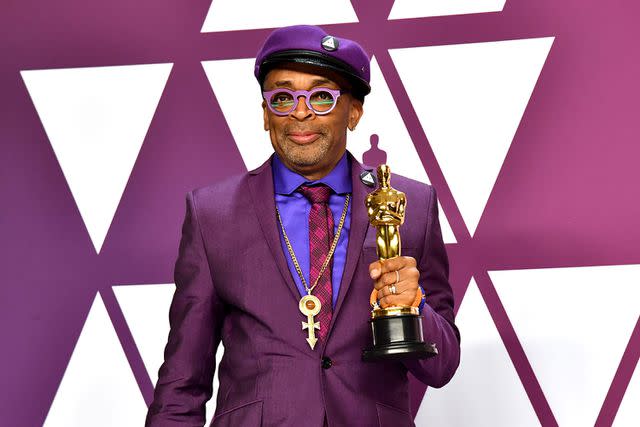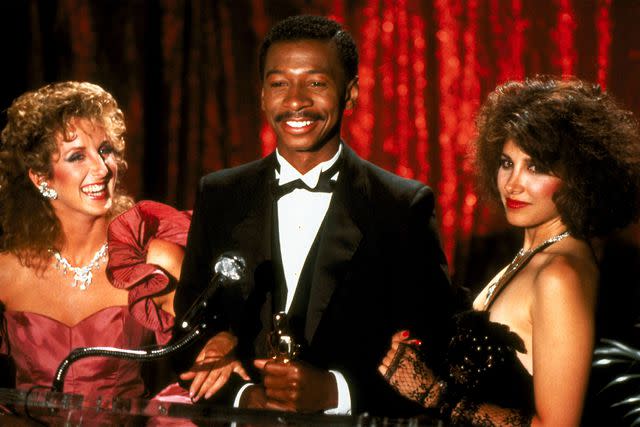“Hollywood Shuffle” taught Cord Jefferson to explore racism on-screen through laughter
- Oops!Something went wrong.Please try again later.
- Oops!Something went wrong.Please try again later.
- Oops!Something went wrong.Please try again later.
- Oops!Something went wrong.Please try again later.
- Oops!Something went wrong.Please try again later.
The "American Fiction" writer-director dives into the films and people who inspired his work and influenced his Oscar-nominated directorial debut.
With his directorial debut American Fiction, Cord Jefferson made a major splash.
Since making the move to screenwriting after a career in journalism, Jefferson is developing a track record for impressive work. After getting his start on Survivor's Remorse, Jefferson went on to work on Master of None, The Good Place, Succession, and Watchmen. That road led to his first time behind the camera with an adaptation of Erasure by Percival Everett, which garnered five Oscar nominations, including Best Picture and a Best Adapted Screenplay nod for Jefferson. The film follows L.A.-based writer Thelonious "Monk" Ellison (Jeffrey Wright) who struggles to find commercial success until he writes a satirical novel mocking the clichés expected from Black creatives that becomes a surprise success.
EW spoke to Jefferson about the storytellers and films that inspired him and his critically acclaimed American Fiction.

MGM ; Orion Pictures - Design: Alex Sandoval
Cord Jefferson; cast of 'American Fiction'Spike Lee
Spike Lee is one of film’s most influential directors and you can count Jefferson as one of the storytellers inspired by him. “Spike Lee was interested in depicting a Black life that we didn’t traditionally see on-screen,” Jefferson says, “He was talking about the breadth of Blackness and the depth and complexity of Blackness.” At a time where Black stories mainly featured gangs, the crack epidemic, and poverty, Lee was expanding the stories being told about Black people, like centering the Black middle class in his debut She’s Gotta Have It. Jefferson found Lee’s fearless storytelling to be appealing. “Spike never made a movie just to entertain. Yes, he wanted to be entertaining, but he also wanted to make you think about what you were watching,” he says. The American Fiction writer-director has long admired the filmmaker’s “inability to shy away from dangerous subjects” and intellectual curiosity, which brings that to his own work.

Jeff Kravitz/FilmMagic
Spike LeeBamboozled
Of Lee’s illustrious credits, 2000's Bamboozled is one that is similar to Jefferson’s Oscar-nominated directorial debut. It follows frustrated Black TV writer Pierre Delacroix (Damon Wayans) who proposes a Blackface minstrel show in an effort to escape his contract through being fired, but instead ends up with a hit on his hands. “There are similar themes about the nature of Hollywood and the expectations it has of Black creatives,” Jefferson says of the connection between American Fiction and Bamboozled. Monk and Pierre both are struggling with the limitations placed on them and their work, which speaks to the realities Black creatives face when trying to make the art they want.
Hollywood Shuffle
Jefferson saw Hollywood Shuffle as a child and it expanded his understanding of what storytelling was capable of. Before watching the 1987 satire directed by and starring Robert Townsend, the stories about Black people delved into the horrors of the past. Through documentaries and movies like Mississippi Burning, Jefferson was seeing the racial dynamics in our country, past and present, through gruesome and horrific imagery. Then he saw Hollywood Shuffle, a satirical film about racial stereotypes in film and TV, at 9 or 10, an age where we started learning about the foundations of American history. “These guys are talking about racism in the same way that those movies are talking about racism, but they're doing it in a way that's supposed to elicit laughter [and] give you joy,” Jefferson explains.

Everett Collection
Seeing Hollywood Shuffle was the beginning of Jefferson’s relationship with satire. “It was like an explosive reaction in my brain,” he says. “There’s another way to talk about these things and so that shaped my outlook on creativity and life in general after that.” He didn’t know to call it satire at that point, but it created the path that would lead him to American Fiction. Racism is something Jefferson sees as ridiculous so talking about it comedically through satire is the perfect avenue for him. “Hollywood Shuffle was the first thing to implant that into my head,” he says.
James Baldwin and Joan Didion
As someone who has worked as a journalist and screenwriter, it’s no surprise writers James Baldwin and Joan Didion are two of his artistic heroes. “These people were just like ‘I’m a writer’ and what it means to be a writer is very big and I can do a lot with this,” Jefferson says. “My heroes were people who don’t limit themselves. People who just want to make stuff, whatever that looks like.” Baldwin, who is known for his books, poetry and essays, Jefferson fondly speaks of Baldwin’s writing the first draft of what became Lee’s film Malcolm X. What they achieved inspired the path that Jefferson is following, one that sees no limits. He sees his journalistic work at Gawker or his films in a similar way. Jefferson is making things broadly. Just like Baldwin and Didion did.
The Squid and the Whale
There’s a mix of comedy and tragedy in American Fiction and one of the inspirations of that tonal balance was Noah Baumbach’s 2005 film The Squid and the Whale. Set in 1986, the film follows two boys in Brooklyn (Jesse Eisenberg and Owen Kline) as they deal with their parents’ divorce. “Squid and the Whale goes from really heartbreaking, sad, tragic moments to moments that make you die laughing. Frequently in the very same scene,” he says. Through the Berkman family, the 2005 film explores the high and lows of a family in New York and in it Jefferson saw the conversations that the Ellison family would have. “This is the overall tone of the film I wanted to make,” he explains.
Wonder Boys
For Jefferson, it was important to know what film they were all aiming to make. To that end he gave American Fiction cinematographer Cristina Dunlap and production designer Jonathan Guggenheim two references for the film’s tone: The Squid and the Whale and 2000 film Wonder Boys. Directed by Curtis Hanson, Wonder Boys stars Michael Douglas as Professor Grady Tripp who is having trouble writing his follow-up novel years after his successful debut. “Tone is a difficult thing, it can be a difficult balance to strike,” he says. ”I wanted to make sure we were making something satirical, but never farcical and tone was incredibly important to nail that point.”
Charlie Kaufman
Percival Everett’s Erasure, the book from which American Fiction is an adapted, is metatextual, so Jefferson looked to someone he perceives as an expert of the form: Charlie Kaufman. He was the writer of Adaptation, the 2002 film directed by Spike Jonze, which was a big influence on American Fiction. There were three tent poles that Jefferson felt were integral to capturing the essence of Everett’s book. “The first is that it needed to be funny because the book is funny. The second is it couldn’t be didactic, it couldn’t spoon feed people morality because the book endeavors not to do that, and the last is it’s metatextual, so that was incredibly important to me,” Jefferson explains. For that third pillar, Jefferson looked to the writer who is the best at it and that was Kaufman. What he did with the script of Adaptation served as a guidepost for American Fiction’s script.
Check out more from EW's The Awardist, featuring exclusive interviews, analysis, and our podcast diving into all the highlights from the year's best in TV.
Related content:
Read the original article on Entertainment Weekly.

